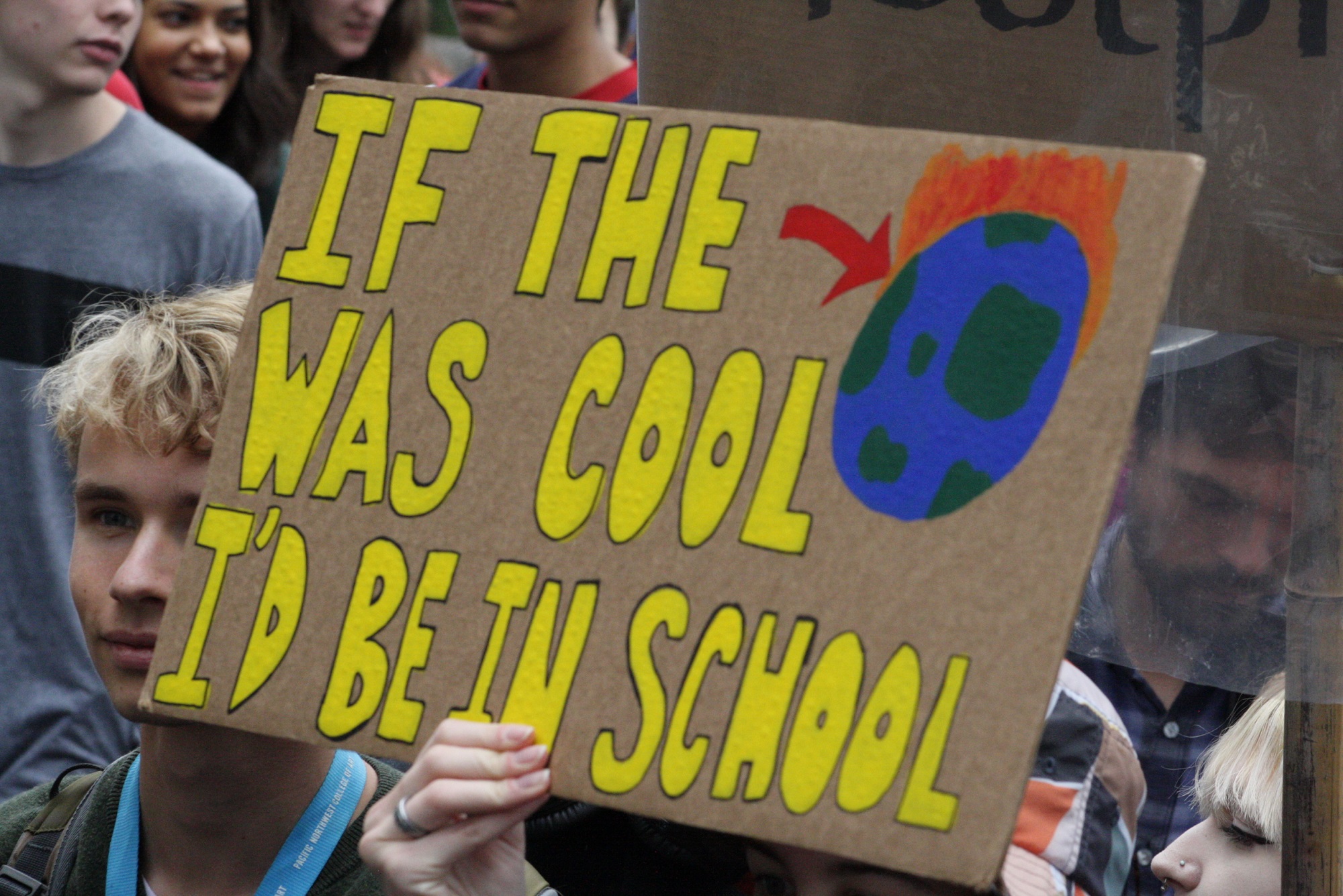We haven’t always talked about climate change. Those of us with a little grey in our hair remember when it was called global warming, which seemed to have a more prescient and urgent ring to it. The iconic Republican pollster and wordsmith Frank Luntz saw how this language wasn’t working well for Republicans, so he sent a memo to the Bush White House in 2001 with the recommendation that they soften their language on the issue. He reasoned that ”while global warming has catastrophic communications attached to it, climate change sounds a more controllable and less emotional challenge.” Needless to say, Luntz’s term has been enormously successful, not just among Republicans, but Democrats and beyond: throughout the world climate change, and its translations, is the most common way we refer to this phenomenon.
Yet Luntz disavowed his work in 2019. He told an ad-hoc Senate Democratic climate panel, “I was wrong in 2001. I don’t want credit. I don’t want blame. Just stop using something that I wrote 18 years ago because it’s not accurate today.” He now urges both Republicans and Democrats to move away from language that provokes fear by describing the problem as a crisis and instead shift the focus to the benefits of action.
Luntz draws his insights not just from polling data but also from talking with voters to understand their preferences and then translating that into messages that will resonate with them. It stands to reason in a democracy that candidates and parties that want to win elections should be responsive to what their voters want. Yet much of political science literature argues that voters, often blindly, get their views and information from their political parties. This aligns with a view of party affiliation as largely tribalistic: we not only take cues from what our leaders say but we also push back against anything that the opposition party says.
Yet, there’s a curious flow of influence going on among Republican leaders and voters, starting with Trump’s climate denialism, which is more an appeal to conservatives than a personal conviction. Republicans have traditionally pitted a healthy economy against action to mitigate global warming, but this is a far cry from the denialism that former President Donald J. Trump embraced, often calling it “a hoax.”
Trump himself has actually taken many different positions, including the full-page ad in The New York Times in 2009 urging support for legislation combatting climate change. It is well known that Trump spends a good deal of time obsessing about polling to figure out how to best fire up his base of voters. According to Joseph Goffman, Executive Director of Harvard’s Environmental Law Program, Trump “believes nothing on climate change – he’s a climate nihilist” who espoused a denialist position in order to appeal to “the part of the Republican establishment that rejects climate policy.”
While climate denialism resonated with the most conservative Republican voters, I personally know two Trump supporters who stuck with him despite his climate-denying ways. This brings up a couple of important points: first, the data shows that most people don’t cast their vote based on climate, it’s usually about the economy and whatever else is the front and center at the moment. Further, the U.S. has two dominant political parties, the Democrats and the Republicans – called “big tent” parties because they include an enormous range of voters and preferences. Polling, however, is a much better measure than my left-coast Republican friends and the data reveals a significant gender and generational divide, but more important is the divide among conservatives and moderates. Pew Research polling shows that 90% of Democrats vs. 39% of Republicans think that the federal government is doing too little to reduce the effects of climate change.
These views, however, are much more complicated on the Republican side, especially when it comes to ideology: only 24% of conservative Republicans agree with the statement, compared to 65% of moderate Republicans. Age is also a significant factor: younger Republicans (41% of Generation Xers and 52% of Millennials and younger) agree, while their Baby Boomer counterparts, aged about 58 and above, aren’t all that bothered about it (just 31%). And finally, gender: Republican women (46%) lean towards wanting more climate action than their male counterparts (34%).
Some Republican leaders see the need to respond to these shifting views and are also listening to the science but they are doing so quietly, in no small part because they fear retaliation from Trump. So, in this sense, tribalism is still at work and cues are being taken from above among Republican politicians, even when many of them are fully aware of shifting attitudes among their own voters.
The Republican Party remains Trump’s party and most Republican leaders live in fear of retaliation if they deviate from his script.
In February of last year, two dozen Republican lawmakers gathered in Salt Lake City, Utah to discuss how to get their party engaged in the global threat of climate change. Representative John Curtis was instrumental in bringing his colleagues to his home state for this meeting but told The New York Times that “some came with the promise of being anonymous. It’s terrible that Republicans can’t even go talk about it without being embarrassed.”
This meeting was organized by the American Conservation Coalition, a “nonprofit organization dedicated to mobilizing young people around environmental action through common-sense, market-based, and limited-government ideals.” Some on the left may roll their eyes at this, but this kind of activism is the country’s best hope in terms of getting Republican lawmakers to the table to even discuss the issue.
The ACC, which is based in Florida, was also behind a rally in Miami that they billed as “the first conservative climate protest in the US.” This past Earth Day, they offered up a “conservative alternative” to the Democrats’ Green New Deal and pushed messages like “conservative values don’t have to conflict with green solutions.” Their proposed “American Climate Contract” recognizes the validity of the science that establishes an “undeniable link between human activity, particularly greenhouse gas emissions, and climate change.” However, this one-page document is thin on concrete proposals beyond public-private partnerships to innovative energy technologies, updated infrastructure, a focus on natural climate solutions and more global engagement.
Young evangelicals are likewise getting involved. Rev. Kyle Meyaard-Schaap is the national organizer and spokesperson for Young Evangelicals for Climate Action asserted in a 2020 op-ed that young evangelicals are no longer skeptical of climate change and that they vote, noting that millennials and Gen Z voters would make up 40% of the voting population in the presidential election. He wasn’t entirely wrong: Trump’s share of the evangelical vote slipped from 80% in 2016 to 76% in 2020, which is significant considering that this included bigger losses in swing states like Georgia and Michigan. While this can be credited to the pandemic and ethical questions surrounding Trump’s presidency, Jim Ball, Founder and Co-chair of the campaign Evangelicals for Biden, told Reuters that he believes that younger evangelical voters concerned about climate change played a role in this shift.
These activists want Republican lawmakers to address climate change via a more conservative and market-based approach and hope that putting pressure on them at the ballot box will help prod them in the right direction. Some campaign advisors are taking notice. George David Banks, a former adviser to President Trump and now a senior fellow at the nonprofit Bipartisan Policy Center, a centrist Washington think tank, told The New York Times, “There is a recognition within the G.O.P. that if the party is going to be competitive in national elections, in purple states and purple districts, there needs to be some type of credible position on climate change.”
This brings us back to the Republican leaders themselves. Politicians, and their advisors, are very deliberate about the issues they pursue. They are not going out on any limb for a cause unless it resonates with their voter base. This is no exact science but any politician and campaign team worth their salt spends a lot of time getting to know their voters so that they can shape their messages to resonate with them.
That said, the Republican Party remains Trump’s party and most Republican leaders live in fear of retaliation if they deviate from his script. The main form of retaliation being that Trump supports another candidate in a primary against them, which affects all members of the House of Representatives who are up for election this coming November and a third of the Senate.
No one exemplifies this difficult position more than House Minority Leader Kevin McCarthy of California, who has been in the spotlight recently for outwardly supporting Trump but then railing against him in private. Even so, last year, he introduced a package of bills aimed at combatting climate change on Earth Day. These didn’t have much in the way of specific targets but were mostly in opposition to Biden’s climate agenda. A couple of months later he created a task force to come up with a policy agenda to address climate change if Republicans take back the house in 2022.
Perhaps more interesting is the Conservative Climate Caucus which was launched ahead of the task force by Rep. Curtis and forty House Republicans. This is the first time that Republicans have organized a caucus to address climate change and the goal is to do more than just messaging but “educate House Republicans on climate policies and legislation consistent with conservative values.”
It’s also worth mentioning that red states are the ones suffering from the most extreme weather conditions caused by climate changes, even if many refuse to make the connection. Furthermore, Republican-led states, especially the ones throughout the deep South will face the greatest economic losses due to climate change in the latter part of this century, according to a study by the Brookings Institute.
Some Republicans do realize, from time to time, that they can’t rely forever on a shrinking base of older, white, male, and conservative voters. After Mitt Romney lost the 2012 presidential election to Barack Obama, the Republican Party did some soul searching and came up with a report calling for more inclusion and outreach to women, African-American, Asian, Hispanic, and gay voters. Nevertheless, three years later, Trump was their nominee and he and the party doubled down on the appeal to white conservative men. As long as Trump looms large over the party, Republican politicians will continue to be stuck between serving their de facto leader and serving the American people. But in the long run, young people will have the final say.
A version of this article originally ran in Spanish with esglobal and it was written as part of the 1 Planet 4 All project.
© IE Insights.











